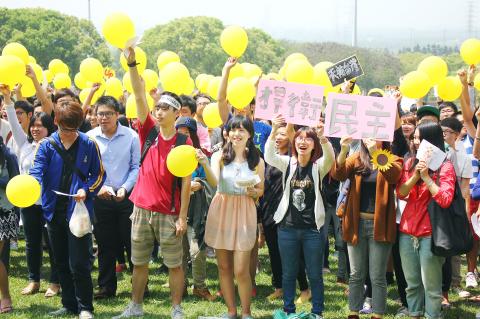A poll released yesterday found an overwhelming majority of respondents — 82.96 percent — are unhappy with the way the administration of President Ma Ying-jeou (馬英九) handled the Sunflower movement protests over the past three weeks.
The survey, conducted by the Chinese-language Liberty Times’ (the Taipei Times’ sister newspaper) polling center on Wednesday and Thursday nights, also found that a majority of respondents thought the student activism would deepen democracy in Taiwan.
The Sunflower movement became the name of the protesters who occupied the Legislative Yuan on March 18 to protest against the government’s handling of the cross-strait service trade agreement.

Photo: Lin Yi-chang, Taipei Times
The movement’s sit-in inside the legislature’s main chamber ended on Thursday evening when more than 100 protesters left the building.
When asked about the movement’s demands that a law governing oversight of cross-strait negotiations be passed before a review of the service trade pact is resumed, 74.19 percent of respondents agreed with the demand, 17.44 percent disagreed and 8.37 percent had no opinion, the poll found.
More than half of those polled — 58.32 percent — were against student protesters having to face legal action over their actions.
Of those surveyed, 34.28 percent favored the judiciary investigating the protesters, while 6.4 percent declined to comment.
Even among supporters of the Chinese Nationalist Party (KMT), the dissatisfaction rates were high.
Analysis showed that among those respondents who said they favored the KMT, 71.16 percent were not happy with the government’s handling of the Legislative Yuan protest, while 25 percent backed the administration.
Among those who said they supported the Democratic Progressive Party, 94.44 percent said that the government had mishandled the situation, while 3.47 percent said they were satisfied with the government’s reaction.
Among those respondents who said they were politically neutral, 82.47 percent did not agree with the government’s handling of the student-led opposition, while only 10.6 percent were in favor.
Comparing the Presidential Office’s response to the Wild Lilies student protest in 1990, when then-president Lee Teng-hui (李登輝) met with student representatives at his office and gave concrete answers to their demands, the poll found that respondents were unhappy with the Presidential Office’s initial criticism of the Sunflower movement and its subsequent sidestepping of the students’ demands.
The Liberty Times poll interviewed 1,015 people aged 20 or above through a random sampling of the last two digits of home telephone numbers nationwide.
The poll has a margin of error of 3.08 percentage points positive or negative and was completely funded by the Liberty Times.

Conflict with Taiwan could leave China with “massive economic disruption, catastrophic military losses, significant social unrest, and devastating sanctions,” a US think tank said in a report released on Monday. The German Marshall Fund released a report titled If China Attacks Taiwan: The Consequences for China of “Minor Conflict” and “Major War” Scenarios. The report details the “massive” economic, military, social and international costs to China in the event of a minor conflict or major war with Taiwan, estimating that the Chinese People’s Liberation Army (PLA) could sustain losses of more than half of its active-duty ground forces, including 100,000 troops. Understanding Chinese

The Ministry of Foreign Affairs (MOFA) yesterday said it is closely monitoring developments in Venezuela, and would continue to cooperate with democratic allies and work together for regional and global security, stability, and prosperity. The remarks came after the US on Saturday launched a series of airstrikes in Venezuela and kidnapped Venezuelan President Nicolas Maduro, who was later flown to New York along with his wife. The pair face US charges related to drug trafficking and alleged cooperation with gangs designated as terrorist organizations. Maduro has denied the allegations. The ministry said that it is closely monitoring the political and economic situation

‘SLICING METHOD’: In the event of a blockade, the China Coast Guard would intercept Taiwanese ships while its navy would seek to deter foreign intervention China’s military drills around Taiwan this week signaled potential strategies to cut the nation off from energy supplies and foreign military assistance, a US think tank report said. The Chinese People’s Liberation Army (PLA) conducted what it called “Justice Mission 2025” exercises from Monday to Tuesday in five maritime zones and airspace around Taiwan, calling them a warning to “Taiwanese independence” forces. In a report released on Wednesday, the Institute for the Study of War said the exercises effectively simulated blocking shipping routes to major port cities, including Kaohsiung, Keelung and Hualien. Taiwan would be highly vulnerable under such a blockade, because it

UNRELENTING: China attempted cyberattacks on Taiwan’s critical infrastructure 2.63 million times per day last year, up from 1.23 million in 2023, the NSB said China’s cyberarmy has long engaged in cyberattacks against Taiwan’s critical infrastructure, employing diverse and evolving tactics, the National Security Bureau (NSB) said yesterday, adding that cyberattacks on critical energy infrastructure last year increased 10-fold compared with the previous year. The NSB yesterday released a report titled Analysis on China’s Cyber Threats to Taiwan’s Critical Infrastructure in 2025, outlining the number of cyberattacks, major tactics and hacker groups. Taiwan’s national intelligence community identified a large number of cybersecurity incidents last year, the bureau said in a statement. China’s cyberarmy last year launched an average of 2.63 million intrusion attempts per day targeting Taiwan’s critical